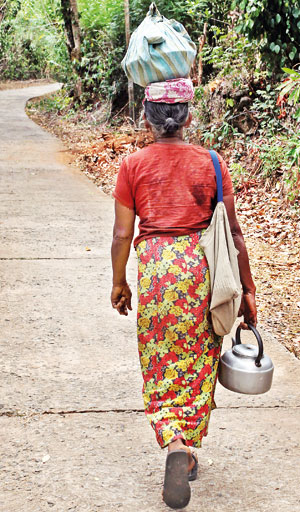National Centre for Aging proposed in new elders’ policy

Women like this villager don't have any financial security
Sri Lanka’s population is rapidly aging and according to projections the share of the population aged 60 years and more will increase to 29 per cent by 2050 from 12 per cent currently and 16 per cent in 2020. It will reach its peak at 34 per cent in 2080, according to the Ministry of Health. In a call for public comments on a “National Elderly Health Policy of Sri Lanka”, the proposed policy says that at the same time, there will be a process of aging of the old people, “as the oldest old people aged more than 80 years, who are the ones most likely to be frail and dependent, will increase from one tenth of the old people population to almost one third. By 2050, the 80+ year age group will account for more than 5 per cent of the overall national population”.
The prevalence of Non Communicable Diseases (NCD) is high among the aging population which contributes to the disabilities faced by elderly. In addition, isolation, lack of dignity and independency, economic instability and inadequate social security system are other social issues faced by elderly which negatively contribute to their health. Traditional family support to old people will be over strained with the rapid aging and modernisation, the report said. It said the present health system in Sri Lanka is not adequately oriented towards elderly health care which requires different models such as long term care, stronger rehabilitative services, day care services and home based care. The proposed policy framework calls for NGOs to ensure elderly health care services are delivered in an equitable manner;
well-trained human resources is available to manage elderly health care which include preventive, curative, palliative care, and rehabilitative and long term care; and empowering elderly care societies, volunteers, community at large, in all aspects of elderly care. Among proposed strategies is the creation of a mechanism to strengthen policy guidelines and service delivery measures for comprehensive health care service for older persons; ensure optimal facilities and human resource provision to provide equitable, integrated curative, preventive and rehabilitative services at every service level; establish a mechanism to build capacity of health and other relevant service providers on care of older persons; and promote research and utilization of evidence based information to practice.
It also calls for strengthening the Directorate of Youth, Elderly & Disabled persons at national level; integrate healthy aging indicators for monitoring and evaluation frame work at all levels; establishing methods to share best practices pertaining to elderly health care at all levels; strengthening old age health care facilities at all health institutions including peripheral community-based care institutions; establish aged-friendly wards with accessibility facilities in health institutions; establish long term care, intermediate care/half-way homes with facilities including rehabilitation services for the older persons; establish a National centre for aging in order to promote post graduate training/research and health care for older persons.
The strategy also recommends an effective communication mechanism for advocacy on promotion of active healthy aging using IT and mass media; advocacy to promote active healthy aging ensuring elder participation as a resource group; activities to incorporate information on promotion of active healthy aging to school/under-graduates/ post-graduate curricular; create public awareness on policies/Acts/action plans and elder rights. It has also proposed a research study to identify the unmet needs of elders, social and financial factors effecting health elder abuse and elderly care related low cost intervention and advocate policy matters and financial authorities in allocating funds for research on elderly health care.
| When will they ever learn! | |
| The public was given two weeks (October 3) to respond to a call for representations on a new Elderly Health Policy in a September 17 newspaper notice by the Ministry of Health, Nutrition and Indigenous Policy but most of the information listed was incorrect. For example the website given is www.health.gov.lk/en/Pub-Opi/Elderly%20Policy%revition%20E4.pdf but it’s impossible to access this since the actual link is http://www.health.gov.lk/en/Pub_Opi/Elderly%20Policy%20new%20revision%20E4.pdf. Note the differences in the two: It should be ‘Pub_Opi’ instead of ‘Pub-Opi’ while the second error was ‘revition’ instead of ‘revision’. The notice also says ‘alternatively click on “National Elderly Health Policy of Sri Lanka (draft) under the category “Policy for public opinion” which it says is on the left side of the ministry home page. But this icon is on the right side of the home page. The Ministry official responsible for the ad doesn’t seem to know the right from the left. When will they ever learn! |


